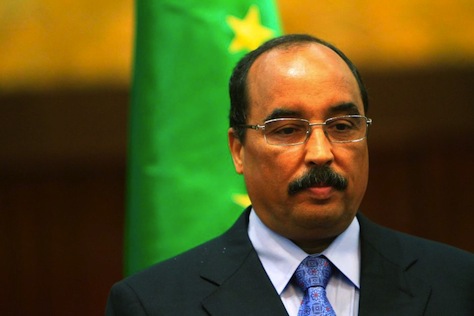Mauritania’s president Mohamed Ould Abdelaziz won a fresh term in elections on Saturday with 81.89% of the vote.![]()
The outcome wasn’t particularly in doubt in the Sahelian country of 3.8 million.
Abdelaziz came to power in August 2008 in a coup against Mauritania’s elected president Sidi Ould Cheikh Abdallahi, who had been elected in a rare competitive election in 2007.
From within the military, Abdelaziz also played a key role in the coup that pushed Maaouya Ould Sid’Ahmed Taya out of power. Ould Taya had served as Mauritania’s prime minister or president consecutively from 1981 until his ouster in August 2005, which was supposed to pave the way for greater democratic participation and genuine multi-party democracy, leading to the 2007 elections.
But Mauritania’s experiment in democracy came to halt with the 2008 coup, a return to form in a country that has now seen six leaders ousted in coups since Mauritania won independence from France in 1960.
* * * * *
RELATED: Mauritania warily eyes internationalized
conflict in neighboring Mali
* * * * *
A former general, Abdelaziz previously served as Abdallahi’s chief of staff at the time of the coup. Abdelaziz reaffirmed his power in a 2009 presidential election.
Perhaps Abdelaziz’s most important accomplishment has been his aggressive stand against radical Islam and Al Qaeda in the Islamic Maghreb (AQIM), which so effectively destabilized neighboring Mali in 2012 and early 2013. Despite a long, porous border with Mali, Abdelaziz preemptively attacked AQIM and associated forces, sometimes sending Mauritanian forces into Mali to rebuff jihadists.
That’s made Abdelaziz a reliable US ally in the Sahel, though US and French officials loudly criticized the military coup that placed Abdelaziz into power six years ago. It’s also given Abdelaziz genuine support among Mauritanian voters, even if the weekend election wasn’t nearly as competitive or fraud-free as the 2007 presidential race.
Algeria, Mauritania’s northern neighbor, where ailing 77-year-old president Abdelaziz Bouteflika won a fourth term in April, is also a strong supporter of the Abdelaziz regime, partly due to Mauritania’s role in Algeria’s longstanding dispute with Morocco over the Western Sahara region.
Mauritania is a poor country where GDP per capita is barely $1,000. Divided between Arab northerners and black southerners, the latter facing longstanding and institutional discrimination, the country is one of the few remaining in the world where slavery remains a chief policy concern. It’s estimated that 10% to 20% of Mauritanians, almost all of whom are Afro-Mauritanians, are enslaved.
So while AQIM and other radical groups may be subdued for now, following French military intervention in Mali and in light of US support in Mali and Mauritania, the country could yet become a refuge for radicals. That will be especially true if, as reports claim, northern Tuareg rebels are taking once again to armed struggle against Mali’s government.
Moreover, it’s an especially challenging time for sub-Saharan Africa. Skirmishes continue in the Democratic Republic of the Congo, and both South Sudan and the Central African Republic are engaged in even more traumatic levels of violence. Kenya, which is suffering from growing attacks by the Somalia-based al-Shabab, is increasingly becoming a concern, in light of Nairobi’s role as a regional hub for international development. Burundi is sliding headlong into a political crisis in anticipation of elections next year. Nigeria, the continent’s most populous country and the continent’s largest economy, faces a peculiarly homegrown challenge in the northern, Islamist Hoko Baram.
For now, Abdelaziz’s efforts to secure the country have boosted Mauritania’s GDP growth, though it hasn’t been enough to radically improve living standards. Oil deposits were discovered in 2001, and Mauritania began exporting oil in 2006, which has contributed significantly to economic growth in a country that previously exported mostly iron ore and agricultural products.
Mauritania’s opposition parties largely boycotted the election. Biram Dah Abeid, the second-place candidate, who won 8.67% of the vote, is a descendant of slaves (his father was freed only shortly before his own birth), and he’s one of Mauritania’s most active anti-slavery activists.
Ely Ould Mohamed Vall, the transitional president who served after Ould Taya’s ouster in 2005 and Mauritania’s presidential elections in 2007, condemned the election as unfair:
“These farcical elections will be supervised by a non-representative commission dedicated to serving the interests of one political party,” Vall said in a statement.
As in parliamentary elections last year, the National Forum for Democracy and Unity, an 11-party opposition coalition, boycotted the voting and condemned Abdelaziz’s ‘dictatorial power.’ Abdelaziz’s Union pour la République (Union for the Republic, الإتحاد من أجل الجمهورية) easily won a majority of the seats in those elections, winning 75 of 146 available seats, with other allies winning additional seats.

Ould Abdelaziz is a traitor and a corrupt !!
The best President of Mauritania is President Ould Taya !!